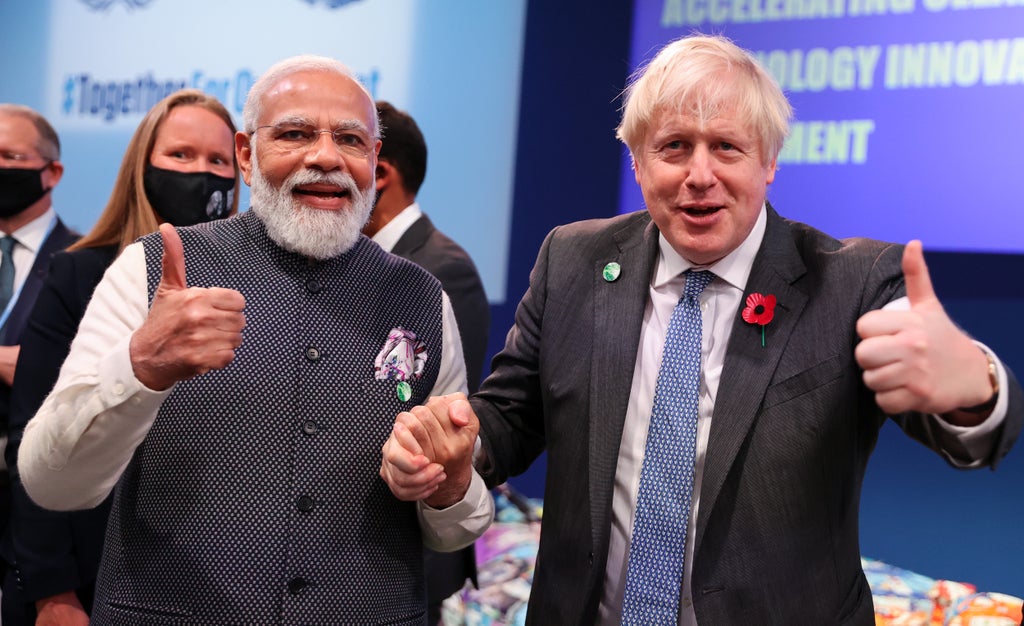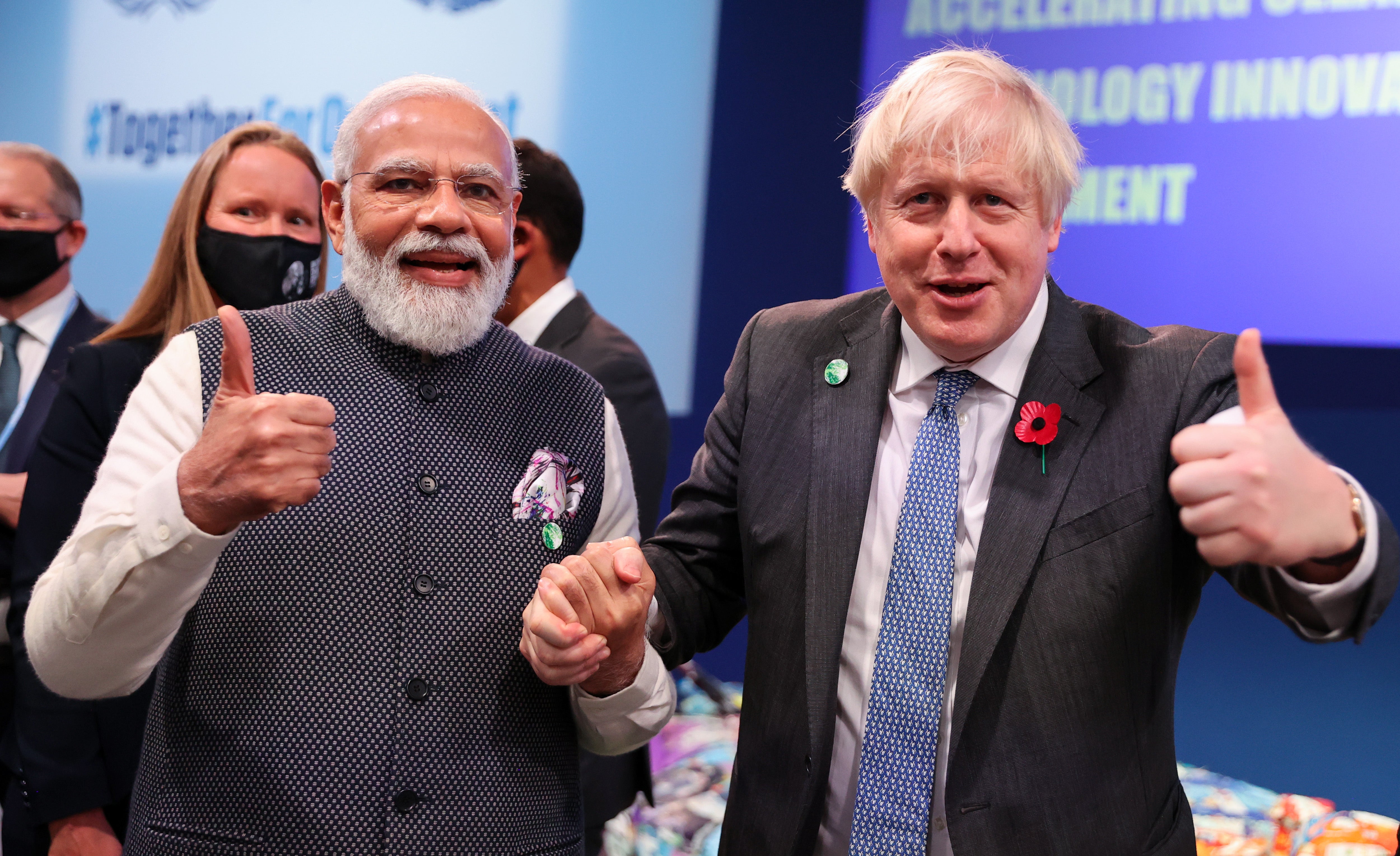
Boris Johnson has said he wants to accelerate a post-Brexit trade deal with India, bringing forward his target date for agreement from the end of 2022 to the autumn.
The announcement came after the prime minister signalled a potential move to break the logjam in talks, by suggesting that he is ready to U-turn on immigration visas for thousands of Indians.
Visas to study, work and settle in the UK have long been a top priority for Delhi in talks with the UK on improving commercial ties. London’s reluctance to open its doors is seen as the principal obstacle to the trade deal, which both sides have previously said they want to conclude by the end of this year.
But Mr Johnson seemed ready to take a more accommodating line as he travelled to India for a two-day visit, which will include talks with the country’s prime minister, Narendra Modi, on Friday.
Asked by reporters whether he would have anything to offer Mr Modi on visas, the prime minister immediately made reference to the UK’s need for “hundreds of thousands” of workers with in-demand skills, who are given favoured treatment under the post-Brexit points-based immigration system.
“I have always been in favour of having people coming into this country,” said Mr Johnson. “We have a massive shortage in the UK, not least in experts in IT and programming. We are short to the tune of hundreds of thousands in our economy.
“We need to have a professional approach, but it has got to be controlled.”
Speaking later during a visit to a JCB factory in Gujarati capital Ahmedabad, the PM made clear he is impatient for a deal, which would be the biggest since the UK formally left the EU last year.
“We’re hoping to complete another free trade agreement, with India, by the end of the year, by the autumn.”
Negotiating teams will start their third round of formal talks in India next week on a trade deal. But sources have indicated that the process is at too early a stage for breakthroughs to be expected during the PM’s visit.
Mr Johnson said that the commercial agreements and export deals to be announced during his trip are worth a total of £1bn and will create an estimated 11,000 jobs, mostly in the UK.
They include a deal for a satellite company rescued from bankruptcy by Dominic Cummings using £400m of UK taxpayers’ money, which intends to launch rockets from India.
Mr Johnson said that relations were boosted by the “living bridge” of people of Indian origin living in the UK, and that he himself has relatives by marriage living in India.
He said that British politicians have to “respect and understand the sensitivities” of the UK’s history as imperial ruler of India, but added: “The great thing about the relationship today is that it is in a different place and it is less encumbered by that baggage.”

The long-awaited trip – twice postponed because of the Covid pandemic – means Mr Johnson is from Westminster for Thursday’s crucial vote on a parliamentary inquiry into allegations he committed contempt of the Commons by lying over Partygate.
The visit threatens to be overshadowed by India’s refusal to condemn the Russian invasion of Ukraine, or to scale back its trading relationship with Moscow. India remains a significant consumer of Russia’s military and energy exports.
However, Downing Street insists the prime minister will not attempt to “lecture” Mr Modi, but will instead offer “constructive” proposals for alternative sources in an effort to reduce the country’s reliance on Russia.
Former aide Mr Cummings persuaded Mr Johnson to authorise the rescue of OneWeb against the objections of civil servants, after identifying the little-known company as a means by which post-Brexit Britain might establish a presence in the satellite communications market.
It aims to put hundreds of small and relatively cheap satellites in a low orbit to provide broadband coverage all over the world, but faces competition from major players including Elon Musk and Amazon.
Today’s deal follows last October’s letter of intent, signed jointly by OneWeb and NewSpace India Limited (NSIL) – a commercial arm of the Indian Space Research Organisation (ISRO) – in which OneWeb’s executive chair, Sunil Bharti Mittal, set out plans to use two Indian-built vehicles as potential platforms to launch satellites from the country.
The company recently called off planned launches from Russia’s Bakonur space facility in Kazakhstan because of last-minute demands from Moscow.
Other agreements announced by Mr Johnson as he arrived in the west Indian state of Gujarat included:
- a new Switch Mobility electric bus R&D centre in the UK, and the opening of the company’s Asia Pacific HQ in Chennai, generating over 1000 jobs in the UK and India
- investment by Indian manufacturer Bharat Forge and electric truck maker Tevva Motors to fund expansion to a new site in the southeast and create 500 new jobs
- Indian software company Mastek investing £79m to create 1,600 jobs over the next three years in the UK
- a deal for Hertfordshire-based Smith & Nephew to sell robotic surgical systems in India
The UK will confirm new science and tech collaborations, including a digital health partnership, new AI scholarships for Indian students, and a £6m investment by AI healthcare specialists Qure-ai to fund the opening of a centre of excellence in the UK.







